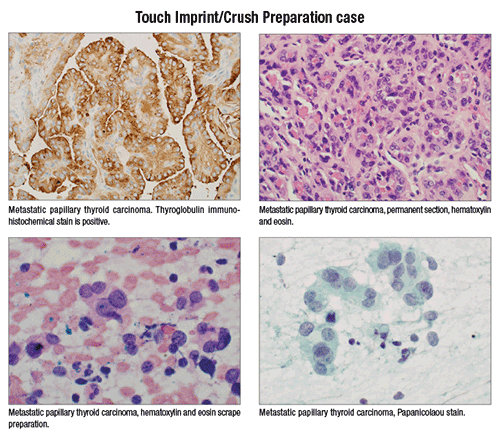
Barbara A. Crothers, DO
Diane D. Davey, MD
January 2017—It’s the end of the year, say, and you are just a few self-assessment modules, or SAMs, short of the required 20 in your area of expertise—anatomic pathology. You have to meet the requirements for the American Board of Pathology’s Maintenance of Certification and time-limited cytopathology and AP/CP certificates for each two-year reporting cycle. What to do?
Your laboratory may already enroll pathologists and cytotechnologists in the CAP Pap Education and Nongynecologic Cytopathology Education programs, but it may not be aware of the Touch Imprint/Crush Preparation (TICP) program. Practices are performing more immediate adequacy assessments and evaluation of core biopsies, and the TICP program is a great way to strengthen interpretive skills and add new skills to your toolkit.
The CAP offers five-credit SAMs online, à la carte, at a reasonable price. These are the same high-quality products your laboratory subscribes to but offered at discounted prices for the individual. Rather than purchase the entire year, you can choose pertinent modules for topics that address your professional educational gaps.
Two of the programs that are especially pertinent to most pathologists’ practices are the online Fine Needle Aspiration and the Touch Imprint/Crush Preparation programs. Both are organized by body system so that pathologists who specialize in one system can add this to their educational armamentarium. For example, neuropathologists may be interested in crush preparations of brain lesions, whereas otolaryngologic pathologists may want to get up to date with thyroid fine needle aspiration criteria. There are two online modules per year for each of the TICP and FNA programs and each provides five CME (and CE) credits.
 The TICP program also offers five SAMs. Each self-assessment module contains four or five cases that include whole slide images of cytology or histology tissues, or both, and static images of pertinent cytologic and histologic features. Each set of cases includes detailed patient history, case photos, ancillary test results, and an in-depth discussion of the differential diagnosis. Feedback is provided for correct and incorrect answer choices, and additional references are provided.
The TICP program also offers five SAMs. Each self-assessment module contains four or five cases that include whole slide images of cytology or histology tissues, or both, and static images of pertinent cytologic and histologic features. Each set of cases includes detailed patient history, case photos, ancillary test results, and an in-depth discussion of the differential diagnosis. Feedback is provided for correct and incorrect answer choices, and additional references are provided.
Two experienced cytopathologists in addition to the CAP education staff provide the peer review for all CAP online programs offering SAM credits. Questions are formatted in accordance with Accreditation Council for Continuing Medical Education standards and are relevant to the text. Participants can complete each case set during one session or return multiple times. Each individual case comes with a differential diagnosis of similar or look-alike lesions and static images of their pertinent features.
The TICP program is a new addition to educational programs designed to introduce pathologists to the advantages of using cytology during intraoperative consultations. The cases often include immunohistochemical panels and discussion of staining characteristics, whole slide images of frozen or permanent sections from intraoperative consultations, and clues from cytology that can confirm or enhance initial interpretation. Detailed clinical information or radiographic studies, or both, round out the assessment to mirror actual practice. The à la carte offerings make it possible for pathologists to tailor their CME and SAM credits to their practice needs, and the case-based active learning approach simulates practice settings. The FNA program does not provide SAMs at this time but stay tuned—we plan to offer them soon.
For more information on the program or to begin ordering your modules, visit the CAP website at https://learn.cap.org/sams.aspx.
[hr]
Dr. Crothers is immediate past chair and now advisor to, and Dr. Davey is a member of, the CAP Cytopathology Committee. Dr. Crothers is in the Department of Pathology and Area Laboratory Services, Walter Reed National Military Medical Center, Bethesda, Md. Dr. Davey is a professor of pathology and associate dean for graduate medical education, University of Central Florida College of Medicine, Orlando.
 CAP TODAY Pathology/Laboratory Medicine/Laboratory Management
CAP TODAY Pathology/Laboratory Medicine/Laboratory Management
